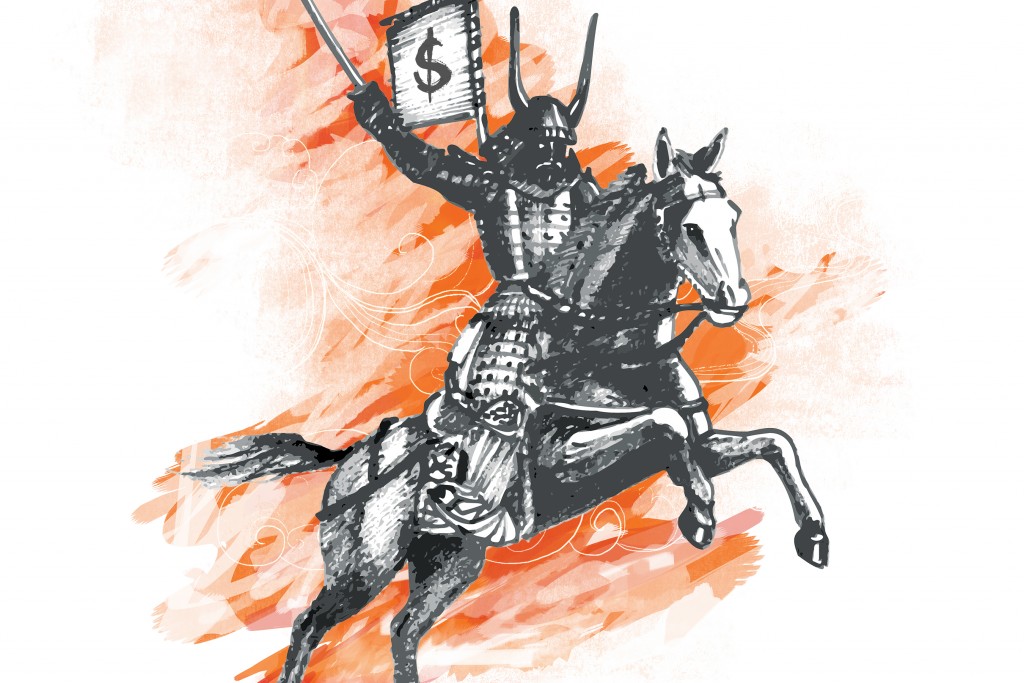Business Samurai

IN HER NEW BOOK, “Why Smart Men Do the Same Dumb Things: A Warrior’s Manual for Change,” Rosalie K. Tatsuguchi explores the idea that an inflexible “samurai attitude” holds back men – and many women – from a rich life and traps them in a cycle of poor decisions. The root of the problem, Tatsuguchi believes, is adherence to Bushido, the warrior code espoused by the legendary medieval samurai Miyamoto Musashi. Bushido requires perfection, stoicism, fearlessness and self-sacrifice. While these qualities help individuals excel in challenging situations, when taken to extremes, they also make for difficult bosses, co-workers and spouses. Tatsuguchi uses a combination of modern science and Buddhist principles to analyze and correct these bad habits. Here’s an edited excerpt from her book.
Miyamoto Musashi’s legacy is his basic assumption that the warrior is expendable. He instructs the warrior to be unafraid of death and willing to die, lest he be worthless to his daimyo, or noble lord. To be unafraid of dying, you must suppress your fear and other basic emotions, which usually leads to subduing all feelings. Ignoring your feelings results in believing you are expendable – other people’s wants are more important than what you need. Therefore, the mandate for fearlessness is this legacy’s strength and its weakness. The strength is that it sees you through difficult times and keeps you going when you shouldn’t quit. Its weakness is that it can lead to abuse through a lack of empathy for others and yourself. This leads to devaluing your busshin, your compassionate and wise inner self.
If you follow Musashi’s way, you probably don’t talk much. You may automatically ignore feelings or emotions when dealing with yourself or others. You have a hard time explaining your ideas. You are a perfectionist. You don’t like to be the center of attention, good or bad. If you were raised with warrior rules, you don’t ask questions, you don’t say much about your feelings and actions. You don’t explain yourself because you think, “It’s just making excuses.”
You don’t see emotions as necessary factors to be considered or shared in any problem that needs to be solved. You may not be consciously aware of your own thoughts and feelings because you’ve learned to habitually suppress them since childhood. The unspoken rules are simple: If people want to know, they’ll ask; if people want you to know, they’ll tell you; don’t tell and don’t ask. This warrior mindset logically spawns corollary rules such as:
- Feelings are irrelevant.
- Do it no matter what, or die trying.
- Practice until you’re perfect.
- Never make a mistake.
- You must be the best at whatever you do.
- Win at all costs.
- Do not show anyone your weakness.
- Keep your thoughts to yourself.
- Be honorable.
- Command respect.
- Trust no one, rely only on yourself.
These injunctions were originally meant for an elite military unit, like the Green Berets or Navy Seals, during battle conditions. They also work well when you are pursuing a difficult goal. They are still highly regarded by ordinary people because they actually help some achieve excellence. On the other hand, they ignore Gautama [Buddha]’s caution for moderation and balance. Even Musashi’s guidance to adjust one’s mindset and actions to the needs of the situation is often ignored. Be aware of when you should ignore your feelings and die trying, and when you should not.
As a fundamental part of your paradigm, Musashi’s warrior rules direct your thoughts, feelings, decisions and actions on subconscious levels. There’s probably little higher-level, cortical brain activity involved. Because you’ve trained your mental processes, your physical and verbal reactions are directed from your primitive brain levels or hypothalamus. They follow a set pattern. Your mental habits automatically trigger responses.
On one hand, you probably don’t have trouble making good decisions and solving problems on issues that don’t involve feelings. On the other hand, while this might work in a warlike environment, that’s not the world we live in. Instead, be aware of your thoughts and feelings on a mindful level to make important decisions, not on an automatic level, otherwise you’ll do the same thing even though it is no longer right or effective.
Read the Book
“Why Smart Men Do the Same Dumb Things: A Warrior’s Manual for Change” is a companion to Tatsuguchi’s 2012 book, “Why Smart People Do the Same Dumb Things: Causes and Cures from Buddhism and Science.” Both are published by Watermark Publishing,* bookshawaii.net.
*Disclosure: Watermark and Hawaii Business share a parent company, aio group.

Photo: Courtesy of Watermark Publishing






